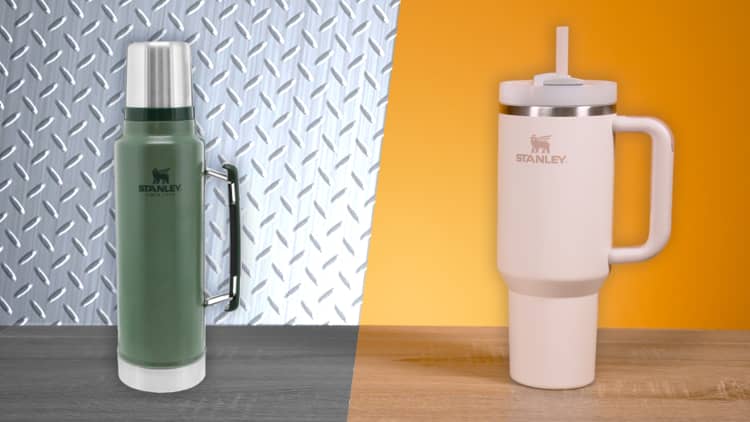For many skincare and makeup products it’s pretty easy to use them up, but there are some like moisturizers, mascara and blush that take more time to get through. And for those, there’s something important to keep in mind: expiration dates.
All skincare and makeup products have them. It might be tempting to keep using an expired product, especially because of just how much they can cost, but experts would advise against that practice.
If you think it’s harmless to use beauty products without knowing their expiration dates, it’s not, says Dr. Michelle Henry, founder of Skin & Aesthetic Surgery of Manhattan and clinical instructor of dermatology at Weill Cornell Medical College.
Using expired beauty products could dry out or irritate your skin because the concentration can change, Henry says.
“We’re putting this on our face; this is delicate skin. If [the product] is compromised in any way you can get an infection,” she warns.
“We’re putting things near our eyes, near our mouths where we have the mucosa that can more readily absorb these things. And those are areas where you can get an infection quite readily. So it’s about your overall health and safety.”
Here’s when you should typically replace your essential beauty products, according to Henry.
Here’s how often you should replace skincare, makeup products
Not all products of the same type share the same formula, so you should always look for the expiration dates on their containers. Typically, they’re labeled as six months or one year, which begins after you’ve opened the product.
Henry suggests labeling your products with the date of when you first opened and used them. “When products are unopened, they have a longer shelf life,” she says. “Most things are made to last at least two years when they’re unopened.”
Cleansers and toners: 6 months to 1 year
“Anything that’s water-based is going to have a higher propensity for growing bacteria and those sorts of things that can make continued use dangerous,” Henry says. Cleansers are often water-based and should be tossed no longer than a year after they’ve been opened.
Toners may need to be replaced even sooner, at six months to a year, because they are more “heavily water-based” than cleansers, Henry says.
Serums: 6 months to 1 year
There’s potential for bacterial growth in certain serums and for efficacy reasons, you may need to toss them sooner. “Depending on the serum, it might be closer to six months, especially if it’s something like an antioxidant like vitamin C that might not be as stable,” Henry says.
“Every time you open it, it’s getting oxygenated.”
Moisturizers and sunscreens: 6 months to 1 year
For moisturizers, Henry recommends replacing them every six months to a year, especially depending on how they’re packaged.
“If it’s a pot [and] you’re putting your finger into it, it’s coming into contact with more bacteria on a daily basis,” she says.
Moisturizers with airless pumps are growing in popularity because they “improve the stability of the product. It doesn’t break down as readily [and] is less likely to get contaminated with bacteria from daily use.”
Sunscreens are very similar to moisturizers and should be replaced within six months to a year once opened. “If you’re seeing it separate, then it’s probably time to get a new sunscreen,” Henry says, which can happen sooner than the expiration date because sunscreens typically break down from excess heat.
Foundations and concealers: 6 months to 1 year
Foundations and concealers “also abide by six months to one year,” Henry says. They’re similar to creams with water content and preservatives that can last for that length of time.
Mascara: 4 to 6 months
“People use their mascara way too long. We often see rashes and can see infections from that,” she says. Henry strongly urges you to replace your mascara within four to six months.
Lipsticks and lip glosses: 6 months to 1 year
It’s best to replace your lip glosses and lipsticks about six months to one year after your first use. “Lip gloss is going be [a] shorter [length] than lipstick, because the formulations are sometimes more water-based,” she says.
Blush and powders: 2 years or longer
Powder-based products typically have a longer shelf life, Henry says. You can find comfort in knowing that if you’ve had your blush or eyeshadow palette for less than two years, then it’s in pretty good shape.
Makeup brushes and beauty blenders
Though makeup brushes and beauty blenders don’t have expiration dates, they should be cleaned pretty frequently. Cleaning them after each use is a bit ambitious, so Henry recommends that you “replace or clean and sterilize [them] at least weekly.”
Don’t forget to do the same for your loofahs, Buf-Puf or other products that you use for applying skincare products.
Want to land your dream job in 2024? Take CNBC’s new online course How to Ace Your Job Interview to learn what hiring managers are really looking for, body language techniques, what to say and not to say, and the best way to talk about pay. Get started today and save 50% with discount code EARLYBIRD.


